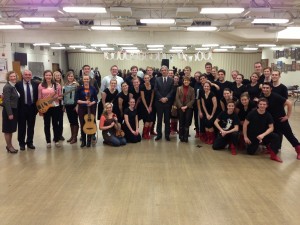Students at the BYU Jerusalem Center are often surprised to hear Jerusalem residents call out, “Mormons! Mormons! We love Mormons!”
This goodwill, often found worldwide, is the direct result of students who participate in BYU’s international programs, performing groups and study abroad and are unofficial diplomats for The Church of Jesus Christ of Latter-day Saints.

“BYU students can be some of the best ambassadors for the university and the Church when we live what we believe,” said Cory Leonard, director of the David M. Kennedy Center for International Studies, in an email.
Associate professor of dance Colleen West has heard reports from missionaries in Belgium who have success after the BYU folk dancers perform in the Center Square. Belgians welcome the missionaries into their homes because they recognize their connection with the dancers they enjoyed.
Students also make an impact without leaving campus. Associate International Vice President Erland Peterson oversees the Ambassador Lecture Series. He explained that ambassadors always comment first on the beautiful setting of BYU; they note the well-kept campus, how well dressed the students are and the impressive depth of their questions.
His Excellency Nuno Brito, ambassador to the U.S. from Portugal, was recently one such visitor to BYU. Brito was invited because the BYU International Folk Dance Ensemble plans to visit Portugal as part of its international tour in 2015. Jonathon Wood, from the Performance Management Office, said tour plans are still being finalized, but the folk dancers gave a special performance for Brito and his wife after his lecture, as they often do for visiting dignitaries. This is just one instance of BYU students’ reaching out to international visitors.
The Folk Dance team always greets the Ukrainian ambassador with the “Hopak” in traditional costume. The “Hopak” is the national dance of Ukraine, and West described it as the cultural equivalent of “Oh, Susanna” in the U.S.
“The ambassadors say, ‘I recognize that dance from my country, and you’re doing it here,'” West said. “You just watch their countenance change from a pleasant smile to this huge smile.”
One relationship created by the Ambassador Lecture Series proved helpful in 1998, when two American missionaries for the Church were kidnapped and held for ransom in Russia. Peterson described how the Church’s efforts to solve the problem were hindered by international “red tape” at first. The issue was resolved with the help of the ambassador to the U.S. from Russia. He had just visited Utah as part of BYU’s longstanding ambassador program, and he intervened to expedite the international rescue process. BYU students, and the goodwill they inspire, opens doors.
For instance, the Young Ambassadors perform for the Chinese dignitaries who visit campus. Their history with China goes back to 1979, when BYU was the second American university group to ever visit China. International study abroad Director Lynne Elliott described how the BYU president at the time, Elder Dallin H. Oaks, sought to make inroads in China, which was then closed to the West.
“Through some fairly miraculous things, they were able to get an invitation to send Young Ambassadors,” Elliott said.
Peterson has spoken to many Chinese dignitaries visiting BYU who say they first “met” BYU during those early days. China had only one television station then, and the state re-ran the shows from the Young Ambassadors, Ballroom Dancers, Wind Symphony and Chamber Orchestra. The scarcity of Western influence at that time may well have helped BYU make an even larger impact.
Associate Dean of Students Sarah Westerberg said BYU’s most important contribution to creating international goodwill for itself and the Church is the students it attracts. One Chinese student visited BYU before applying and was thrilled when someone greeted her in flawless Chinese.
A native of England, Westerberg stressed that students who represent BYU abroad must do so well. She has seen Americans abroad who perpetuate the stereotype of rude American tourists, but she believes the gospel, and BYU students, can temper that.
“We take our BYU brand with us, and the gospel integrates to that brand,” Westerberg said.
English major Ashley Brocious was surprised to find the “BYU brand” in Jerusalem. While walking the streets of Jerusalem after her arrival to study at the BYU Jerusalem Center, strangers warmly heralded her. The prominence of the BYU presence in the Holy City surprised her.
“People know who we are,” Brocious said.




